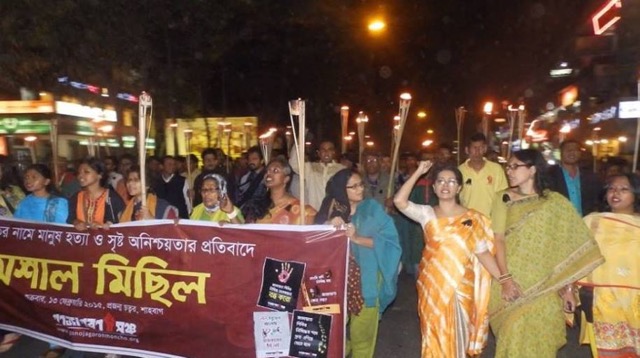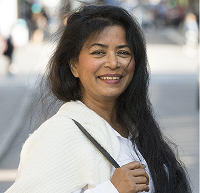
DEBATT I morgon, den 30 september, är det den internationella blasfemidagen – en dag till stöd för yttrandefriheten och rätten att utmana religiösa föreställningar. Den inrättades 2009 till minne av Jyllandspostens publicering av Mohammedkarikatyrerna den 30 september 2005, som väckte våldsamma reaktioner runtom i världen, med attacker mot danska ambassader och bojkott av danska varor.
Omkring en fjärdedel av världens länder har lagar eller andra påbud mot ”hädelse”, ”kränkning av religiösa känslor” eller ”förtal av religion”. De kan användas för att inskränka yttrande- och pressfrihet och tysta kritiska röster genom att fängsla, och till och med avrätta ”hädare”. FN och flera människorättsorganisationer har länge arbetat för att förmå länder att respektera yttrande- och tankefrihet genom att avskaffa hädelseförbuden.
Den bangladeshiska författaren Jahanara Nuri skriver idag om hur blasfemianklagelser används mot människorättsaktivister i hennes hemland, som hon själv tvingats lämna på grund av förföljelse. Hon kom för två år sedan till Sverige som fristadsförfattare i Linköping. Hon har också deltagit i Reportrar utan gränsers projekt Kollega till kollega, till stöd för nyanlända journalister och författare.
Här nedan skildrar Jahanara Nuri hur Bangladesh, som enligt grundlagen är ett sekulärt samhälle, använder olika informella påbud och lagtolkningar för att motarbeta alla krav på grundläggande demokratiska fri- och rättigheter. Samtidigt blundar myndigheterna för militanta muslimska gruppers upprepade våldshandlingar och mord på demokratiaktivister.
How to not have a Blasphemy Law
‘Murtad’! ‘Atheist!’ The Qawmi Madrasa leaders have been roaring in their public meetings to incite their students against us.
August 8, 2015. The day before, our fellow activist Niladri was slayed by the Islamist militants, during the Friday noon prayer. We held a protest rally in Shahbag Square in Dhaka. I was talking to the crowd before the procession started. Suddenly my eyes went to one of the spectators. The fire in his eyes would burn me to ashes. Fear is a reality to us.
Through heartbreak and loss, we have walked the funeral corteges one after another: architect, online blogger, bankers, writer, professor, poet, publisher, students, folk singers and many more.
According to the guidelines of Islamic Jurisprudence, murtads and atheists were told to stop. Informed that ‘death is waiting for you’. A person who is born in Islam and later rejects it, is called ‘Murtad’. One among the four accepted schools of Islamic Jurisprudence of Sunni Islam is Maliki. Maliki Fatwa ensures death sentence for apostates!
Death punishment for apostates
Imams at the Hanafi school worldwide have unanimous consensus that a male apostate must be put to death, while a female must be arrested, imprisoned, and flogged until she returns to Islam or dies.
Names of activists kept appearing on fake social media sites. For months, trained teams in disguise followed their targets, found out activists’ whereabouts and pattern of mobility. Suddenly a certain website announced: ‘target loading’. Next, we heard news headlines about another killing. ’Then who?’ Immediately the thought came. You do not want to think, you are the next target.
Machetes struck the victim on the neck, head, and main vein, while ‘Allahu Akbar’ sound declared a holy sacrifice of ‘an enemy of Islam’.
On 9th August 2015, The Cabinet Committee for the Law and order headed by Amir Hossain Amu decided ‘to declare Atheist authors as criminals (kalerkantho, 2015-08-10). Continued planned purge of the progressive secularists and rights activists by the Jihadi vigilantes; and these went unprotested.
‘There is no place for Islamic militancy, terrorism and corruption’, said the Prime Minister on May 10, 2018, at a meeting organized by the Islamic Education Board – an association of the Islamists.
Pressure for a law to prevent insults to Islam
If we go back in time, we can see: in 2013, the Islamist group Hefazat-e-Islam putting pressure on the government to ”pass a law in parliament providing for the death penalty to prevent insults to Islam.” On 8 April 2013, in an interview with BBC about this demand for tough action against Shahbag leaders and activists, the PM said: ”Existing laws are enough.”(BBC News, world Asia, 8, April, 2013)
True. In 1992, Professor Dr. Ahmed Sharif was charged under Sections 295A and 298 of the Penal Code. In addition, a secular penal code (1860) has existed since British rule – which prohibits ”hurting religious feelings”.
Even then, the ICT Act (2006) passed by the Khaleda Zia’s regime was amended and section 57 of the ICT Act was made. The section authorized prosecution of anyone who publishes in electronic form, materials that is: fake, and obscene; Defamatory; ’tends to deprave and corrupt’; causes or may cause ‘deterioration in law and order’ and may hurt religious belief.
1271 charge sheets were filed between 2013 and April 2016 for cases with the Dhaka Cyber Tribunal under section 57.
No, we do not have any Blasphemy law.
Digital Security Act of 2018
Section 57 morphed into the Digital Security Act 2018. It would not be an exaggeration to say that the special section of Article 57 and the Act of 2018 resonate the purpose of the proposed Blasphemy Bill based on the Blasphemy Law of Pakistan. In 1993, the then Secretary General of Salafist Jamaat-e-Islam introduced the Blasphemy bill in the Parliament of Bangladesh. It was not passed.
But why saying there is resonance?
First, most of the cases filed referred to one religion: Islam. Whereas laws applied to communities. Second, the Islamists define the offence to ‘insult to the religious sentiment of citizens’ as, offence to insult ‘Islam or the Prophet’. Even Sheikh Hasina, on10thMay 2018, stated that the religion of Bangladesh ”is Islam. Anyone who pronounces offensive comments against it or against the Prophet Muhammad, will be prosecuted according to the law”. Third, opportunity for rights violation of the ‘others’ increased: The need for arrest warrant and formal permission for trial removed: the trial and the release of detainees on bail restricted: and the term of imprisonment, if convicted, extended.
A step towards a Blasphemy Law
Thus, a progress was achieved towards a Blasphemy law – that was rejected in 1993 and reiterated in 2013. People have been detained for months even before being released pending trials. 60-day window for investigation, then report submission, plus post investigation; the process may take up to 105 days.It is a surprise to many that constitutionallyBangladesh has proclaimed a secular stand. Islamist militia and Pakistan Army killed many free thinkers, on 14th December 1971- just forty-eight hours before the independence of the country. But murder, violence, bombs kept shaking the earth under our feet. Pen in hijab. At the National Book fair, the police confiscated or banned books for sentences deemed blasphemous.
‘Fear is the narrative of this century; and it’s global. If we want a change, we should ask ‘who creates fear, for what, and how?’ How we deal with fear can give a message to fear entrepreneurs. Intimidating mobs, to control, has always been popular among dictators, radicals, and their allies. Neither in South Asia nor in Europe people are free now. The road to healthy democracy is being made difficult. The space of civil society is shrinking, as the elements of extremism are helped to occupy space. The independent judiciary, law binding rule, and human rights are being invaded by misogynistic culture of violence, inequality, and patriarchy. We are pressed to hate us.
Revolution of information
Despite appeal of fear to its preachers as well as to victims, the digital era has brought about a revolution of information. Which led to the rising voices of youth around the planet. For example, Shahbag protest in Bangladesh, taught a nation to reclaim own history. We have learned to guard and save the common human heritage like compassion, tolerance, and cultural diversity, by our lives.
The drivers of the pluralistic debates stirring social dynamics are killed, imprisoned, or forced into exile. As voters, policy makers and administrators, we need to be concerned about our collective freedom. Being inactive in the face of such crimes, is also a crime. It allows evil to win by devastating ethics. As a result, injustice prevails.
Sixty-four veterans of the Afghan war returned to Bangladesh for ‘Jihad at home’. But to the government the murders have been ‘isolated cases’. Over the past several decades, the systematic Islamization of Bangladesh has been supported by outside forces and the locals have acquitted them.
By separating politics from the people, hiding crime and corruption behind ideology, the hope of the new generation is being taken away.
We must stand for free thoughts and fight the factors that contribute to artificially created religious intolerance. We must have a critical narrative of oppression by ideas and policies that support them.
We were not safe and hiding behind myths cannot protect us.
 Jahanara Nuri
Jahanara Nuri
Jahanara Nuri är en bangladeshisk författare, journalist och aktivist, som länge strävat efter att ge röst åt de röstlösa. Under tre årtionden har hon genom olika organisationer arbetat för att bygga bygga upp det krigshärjade Bangladesh. Hon lever nu i exil i Sverige.
Vill du skriva en text där du kommenterar, diskuterar eller kritiserar detta inlägg? Kontakta ämnesansvarig redaktör.
Redaktör: Lotta Schüllerqvist, chefredaktör, Press- och yttrandefrihet, Mellanöstern.

Isabella säger
Thank you for this article! It gave me an analytical insight and touched me as a person. Thank you for your fight!
Jahanara Nuri säger
Thank you Isabella for the nice inspiring words.